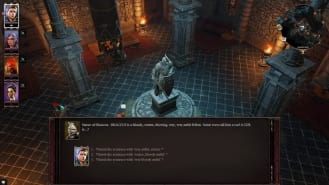
Door of Truth
By Anthony Casperson
7-10-21
Early on in the game Divinity: Original Sin 2 you come across a room with multiple doors. Of course, there’s the one that your characters just entered through. But many more stand. And only one is the correct exit allowing them to continue on the path toward their role in the game’s fictional history.
A couple of the doors, as you attempt to open them, disappear into nothingness. Illusionary images that lied about their usefulness. Then, there’s another door that does actually open, but it shoots a gout of flame at the character unfortunate enough to have opened it. And another that proffers a spray of acid. Neither of these doors lead to anything other than injury and a dead end.
But there’s one more door that provides no method of interaction. You can’t open the door via the usual means. It’s gotta be the exit (especially if you notice the mini-map continues the path beyond it). However, it seems impossible to delve deeper into this treasure cache that leads you closer to your characters’ destiny.
Other objects exist in the room besides the interactable doors. One of which is a statue. When you press the interact button, the statue begins to talk. What it says is a riddle along with its answer key. Not really the best security system, except for the fact that the statements don’t really sound like a riddle or the key to solving it.
I’ve seen multiple people get to this point in the game. Many of whom have difficulty understanding the point of the words. They’ve had to ask the chat watching along with them. Some looked up the answer or had a friend sitting alongside who already knew the way through. But only a small number of them have actually solved the puzzle by themselves.
And when you answer the riddle, or technically two, the statue even asks if you needed help in solving the puzzle. Insinuating that the answer came too easily and quickly. As if the game development team knew this could be a brain burner that required online help.
Once the riddle’s solved, the statue opens the true door. It remains open for the rest of the game and there’s no means by which it can be closed again. And your characters are set to continue on toward their primary mission.
The blending of truth vs. falsehood and doors takes center stage as we move to Revelation 3:7-13 in the “Summer Revelation” series that we’ll conclude next week.
Here, we’ll look at the church in Philadelphia. No, not in Pennsylvania. The ancient Greek/Roman city that still stands, though with a new name, in modern day Turkey.
A little background about the city before we dive into the biblical passage. Philadelphia seems to have been built by the Greek Empire as a means to spread the culture beyond the nation’s borders and into the lands of the “uncultured barbarians.” This city of brotherly love was the bridge, the gateway, or perhaps the door, to the rest of the world beyond the empire.
Historically, the city itself wasn’t a major political power. As far as religious authority goes, there might have been a lot of temples to various false gods, but those seemed to be there mainly for the expansionary mission of the city. And other than very fertile soil, there weren’t a whole lot of important resources.
So, it seems that its location as doorway to other lands remained the primary reason why the city continued to stand during both the Greek and Roman Empires. Even being rebuilt after an enormous earthquake razed multiple other cities that were not granted such rebirth.
It was to the followers of Jesus in this ancient city that he speaks in this passage. As always, Jesus begins with an image of himself. Three parts of the image from chapter 1 make up this picture.
First, Jesus is the holy one. He’s set apart for a specific mission. But also, he’s God. The one by whom holiness is measured. He has God’s authority.
Second, he’s the true one. The real, actual, authoritative one. Everything beyond him is false.
But the third piece of the image has a slight shift from its counterpart in the picture of Jesus from chapter 1. The earlier version shows Jesus as having the keys to Death and Hades. He, as the resurrected one, had authority over sin and destruction. He could provide such life to all who follow him. However, chapter 3’s mention of keys refers to the key of David.
Why the change? Well, the addition of the words about opening a door that none other can shut/lock, and shutting/locking doors that none can open, points us back to the words of Isaiah 22:22. Words that the Jewish followers of Jesus (which many of the church in Philadelphia seem to be) would be familiar with. They speak of one who has authority to rule the house. The kingly right that finds its culmination in Jesus.
So, Jesus reveals himself to them as the holy and true Messiah, both God and human king. He has full access to that authority. And he alone grants the doorway to his kingdom.
Moving to verse 8, Jesus commends them in using what they had available to them in proclaiming his name. He’d given them an open door and they boldly walked through to the mission set before them. Though few would envy their little strength, what the followers of Jesus in Philadelphia had accomplished with that feeble ability and the power of God was amazing.
They kept Jesus’ words and didn’t deny his name. There were few among the seven churches that could match the faithfulness of the church in Philadelphia.
As a matter of fact, where the pattern set by Jesus in these two chapters should lead us the correction and call to repentance for the church, we see no such words to Philadelphia. Verses 9-10 reveal words of correction and needed repentance for those outside of the church in that city as the culture of Christ reaches beyond the borders of his kingdom.
The synagogue of Satan is mentioned in those verses. Jewish individuals in the city who had rejected the call to their true Messiah. Those who turned to the illusory and harmful doors that were nothing but a lie.
But just like Jesus gave the true and open door to the church in Philadelphia, he also gives the synagogue of lies to his followers as well. Jesus’ followers are to represent his authority to these faithless people. They’ll be made to bow down before the church. Some willingly as they submit to the truth shared by the church, and the rest commanded to bow by the God of the universe that they rejected.
Regardless, these people who followed a lie will discover the truth about the church in the city that not only has brotherly love, but the unconditional love of the great God with all authority.
The reason for this sharing of his authority with the church is because they’ve kept the truth of his patient endurance. They’ve proclaimed the truth of his kingdom during the time that he’s provided before judgement comes. And so, while others will have to stand in that judgement, these followers of his will be kept from that hour of trial. The hour that arrives with his return.
Jesus cautions the church in verse 11 to keep hold of the things that they have so that the victor’s crown won’t be stolen away. We might have victory in sight, but we shouldn’t let that keep us from continuing in his work.
When we reach verse 12, Jesus promises to those who conquer, who hold the victory, to make them a pillar in the temple of God. Whether Jesus refers to pillars like members of a society that are lifted as example, or like memorials that proclaim the greatness of the one to whom the temple belongs, both are true.
And nothing will cause the pillars to be removed from their location. No falsehood, no earthquake, no destructive force will dislodge such pillars. Those who bear the name of God, the New Jerusalem, and Jesus.
The holy king of the universe has set forth a true and open door before us. We stand as those who should proclaim the culture of his kingdom. Let us continue in our mission. It doesn’t matter how powerful we are, how smart we are, how important we are, or how (fill in the blank) we are, nothing can stand against the greatness of the one we follow. Nothing can close the door that he opens. And he has shared that authority with us. Let’s work in it.
Let us hear what the Spirit says to the churches as we proclaim the truth with him.



